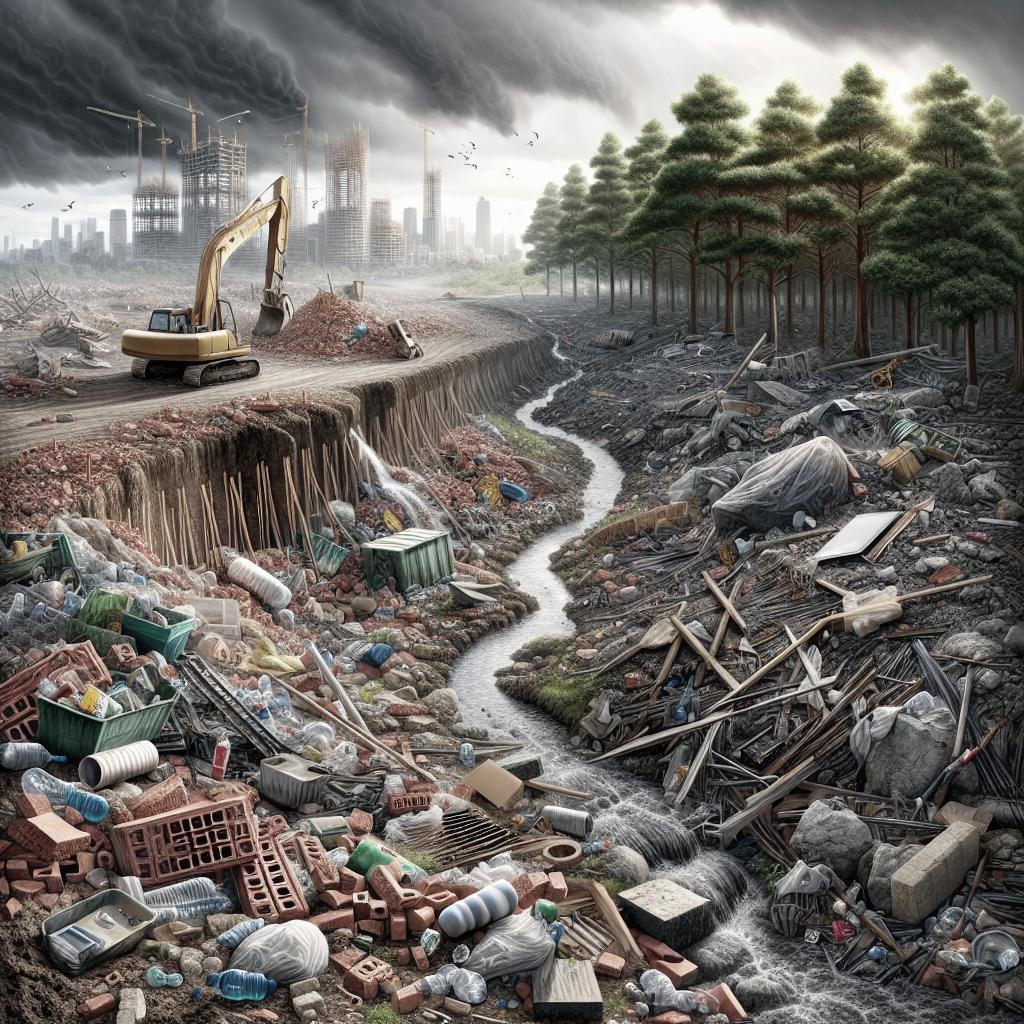“`html
The Impact of Construction Waste on the Environment
Construction waste, a byproduct of building activities, remains a burgeoning issue affecting the environment. As urbanization accelerates and infrastructure expands, understanding the nature of this waste, its environmental effects, and sustainable solutions become critical. This article delves into the origins and types of construction waste, the significant ecological ramifications, sustainable practices for waste management, and the critical role of effective waste management strategies. Highlighting compelling insights and practical solutions, it aims not only to inform but also to inspire action towards effective environmental stewardship in the construction sector.
What is Construction Waste?
Construction waste refers to the unwanted materials produced during the building, demolition, or renovation of structures. It includes various substances like concrete, wood, metals, glass, and ceramics. These materials arise from diverse stages of construction processes—from site excavation and masonry to finishing work, leading to significant debris and refuse. The prolific generation of such waste presents a pressing challenge, necessitating effective strategies for disposal and management.
The composition of construction waste is heterogeneous, depending on the type of project—be it residential or commercial. For instance, while a residential project might generate substantial wooden debris, a commercial skyscraper could contribute a significant amount of steel and glass. Identifying and categorizing these materials is the first critical step in formulating effective waste management strategies, thereby mitigating their potential impact on the environment.
Environmental Consequences
The environmental impact of construction waste is profound and multifaceted. Lands filled with construction debris often result in habitat destruction, disrupting the ecosystems that thrive in those areas. Moreover, discarded construction materials, such as concrete and plaster, can leach harmful chemicals into the soil and groundwater, posing significant risks to both plant and human health.
Beyond direct ecological damage, the improper disposal of construction waste contributes to broader environmental issues. For example, the incineration of materials like plastics releases toxic emissions into the atmosphere, exacerbating air pollution. Additionally, waste that is not efficiently managed often ends up in landfills and contributes to the ever-growing issue of landfill overflow, necessitating increased land usage and deforestation.
Sustainable Solutions
Implementing sustainable solutions is crucial to curbing the environmental impact of construction waste. Recycling and reusing materials present practical ways to reduce waste. By reclaiming components such as metals, glass, and certain plastics, the construction industry can significantly lessen its ecological footprint. These materials can often be processed and reshaped or repurposed for new construction projects, offering an eco-friendly alternative to new resource consumption.
Moreover, advancements in green technology and sustainable design practices offer promising avenues for minimizing waste generation. Techniques such as modular construction, which uses prefabricated parts, or implementing strict waste sorting practices at construction sites, help optimize resource use and reduce waste outputs. Incorporating these practices aligns modern construction with sustainable development goals, paving the way for more ecologically conscious building projects.
The Importance of Construction Waste Management
Effective construction waste management is pivotal for both environmental health and economic viability. By managing construction waste thoughtfully, companies not only adhere to environmental regulations but also realize financial benefits through cost savings from material conservation and reduced disposal fees. Implementing comprehensive waste management plans can also elevate a company’s reputation, reflecting its commitment to sustainability and responsible business practices.
Education and policy play integral roles in advancing construction waste management. Elevating awareness about the impacts of construction waste and training for best practices can empower stakeholders throughout the industry to prioritize waste reduction. Furthermore, governmental policies and incentives that promote recycling, reuse, and the adoption of sustainable building materials can accelerate the implementation of effective waste management strategies across the sector.
Future Prospects
| Aspect | Description |
|---|---|
| What is Construction Waste? | Unwanted materials from construction projects, including concrete, wood, metals, and more. |
| Environmental Consequences | Habitat destruction, chemical leaching, air pollution, and landfill overflow. |
| Sustainable Solutions | Recycling and reusing materials, modular construction, green technology. |
| Importance of Waste Management | Economic viability, adherence to regulations, improving company reputation, policy impacts. |
“`
